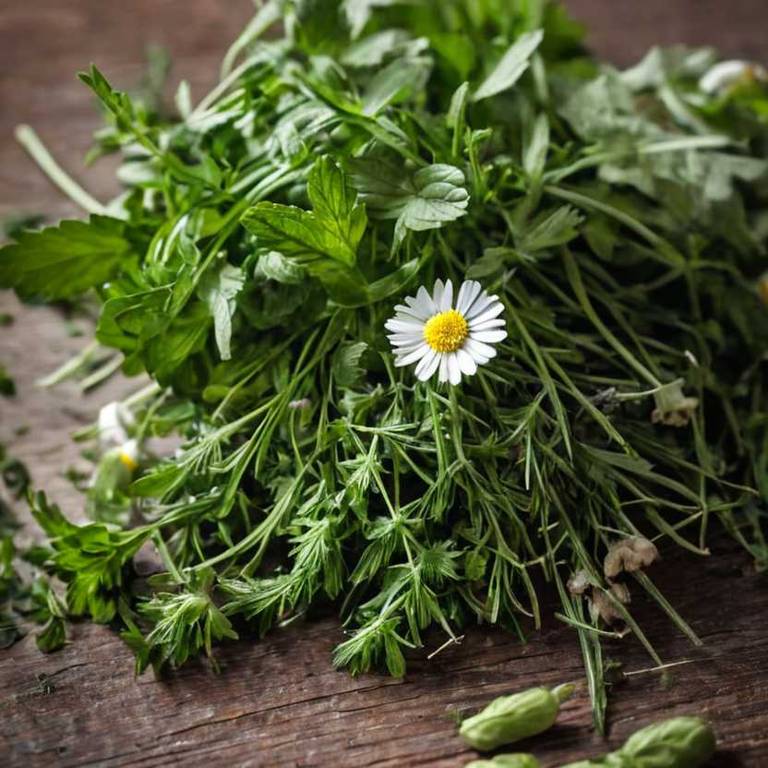By Leen Randell
Updated: Jul 06, 2024
What Are The Medicinal Properties Of Bellis Perennis (Daisy)?

Bellis perennis, also known as daisy, has health benefits such as anti-inflammatory and antiseptic properties, making it effective in treating wounds and skin irritations.
The herb contains medicinal constituents like flavonoids, saponins, and terpenoids, which contribute to its therapeutic effects. Medicinal preparations of Bellis perennis include topical creams, salves, and infusions. Possible side effects may include allergic reactions and digestive issues in sensitive individuals.
Precautions include consulting a healthcare professional before using the herb, especially for pregnant or breastfeeding women.
This article explains the health benefits, active constituents, medicinal preparations, possible side effects, and precautions related to Bellis perennis.
What are the health benefits of Bellis perennis?
Bellis perennis, also known as daisy, has health benefits such as reducing inflammation and improving skin conditions due to its anti-inflammatory and antiseptic properties.
The flowers and leaves have been used in herbal medicine for centuries to treat various ailments, including wounds, eczema, and acne. The plant also contains antioxidants, which can help protect against cell damage and promote overall well-being.
Its medicinal properties make it a popular natural remedy.
Here's a detailed article about the 10 health benefits of Bellis perennis.
What are the active constituents of Bellis perennis?
Bellis perennis, also known as daisy, has active constituents such as sesquiterpenes, flavonoids, and phenolic acids.
These compounds are responsible for its medicinal properties, including anti-inflammatory and antioxidant activities. The plant's flowers and leaves are rich in triterpenes, particularly bellidin, which has been shown to exhibit hepatoprotective and antiviral effects.
These constituents contribute to its use in traditional medicine, where it is valued for its wound-healing, anti-inflammatory, and antiseptic properties.
Here's a detailed article about the 10 active constituents of Bellis perennis.
What are the medicinal preparations of Bellis perennis?
Bellis perennis, also known as daisy, has medicinal preparations such as infusions, salves, and ointments.
The leaves and flowers are used in herbal remedies to treat various ailments. The plant's anti-inflammatory and antiseptic properties make it useful for soothing skin irritations and wounds. It is also employed in treating fever, rheumatism, and menstrual disorders.
The daisy is traditionally used to promote digestion and alleviate anxiety and stress.
Here's a detailed article about the 10 medicinal preparations of Bellis perennis.
What are the possible side effect of using Bellis perennis improperly?
Improper use of Bellis perennis, also known as daisy, increases the chances of experiencing side effects such as skin irritation, allergic reactions, and digestive issues.
Consuming excessive amounts can lead to nausea, vomiting, and diarrhea. Additionally, topical application of daisy extract may cause skin redness, itching, and rashes.
These side effects can be avoided by using the plant in moderation and following proper preparation and dosage guidelines.
Here's a detailed article about the 10 most common side effects of Bellis perennis.
What precautions to take when using Bellis perennis medicinally?
Before using Bellis perennis, also known as daisy, for medicinal purposes, you must take precautions such as consulting with a qualified healthcare practitioner to determine the correct dosage and usage.
The plant's medicinal properties can cause allergic reactions, digestive issues, and interactions with other medications. Additionally, pregnant and breastfeeding women should avoid using the plant due to its potential effects on the fetus or baby.
Proper identification is also crucial.
Here's a detailed article about 10 precautions to take when using Bellis perennis.